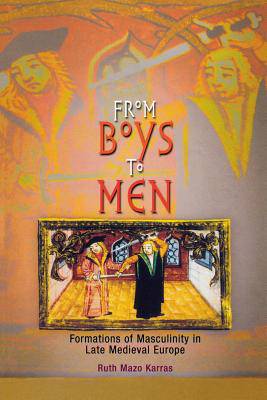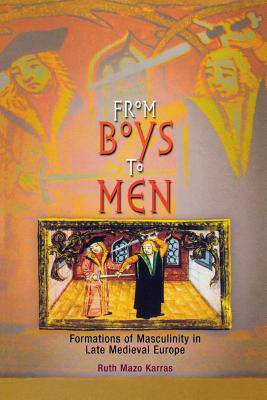
- Retrait gratuit dans votre magasin Club
- 7.000.000 titres dans notre catalogue
- Payer en toute sécurité
- Toujours un magasin près de chez vous
- Retrait gratuit dans votre magasin Club
- 7.000.0000 titres dans notre catalogue
- Payer en toute sécurité
- Toujours un magasin près de chez vous
51,95 €
+ 103 points
Description
From Boys to Men Formations of Masculinity in Late Medieval Europe Ruth Mazo Karras "A founding document in the field of men's history."--Jo Ann McNamara, author of Sisters in Arms "The book, well written and accessible, will find a broad audience. It would work well in the classroom, either as a source of lecture material or as assigned reading. Effectively combating the nonspecialist's view of the Middle Ages as a monolithic and static society, it will encourage more subtle thinking about gender identities in the past and in the present. The book also sets a research agenda for specialists.--American Historical Review "Part of the achievement of this fine book is the care with witch it unfolds material and textual evidence of male and female relations. No less valuable is its subtle acknowledgment that modern preoccupations with gender and sexuality can prompt overreading of sources."--Journal of English and Germanic Philology "Extremely welcome."--History While the social identity of women in medieval society hinged largely on the ritual of marriage, identity for men was derived from belonging to a particular group. Knights, monks, apprentices, guildsmen all underwent a process of initiation into their unique subcultures. As From Boys to Men shows, the process of this socialization reveals a great deal about medieval ideas of what it meant to be a man--as distinguished from a boy, from a woman, and even from a beast. In an exploration of the creation of adult masculine identities in the fourteenth and fifteenth centuries, From Boys to Men takes a close look at the roles of men through the lens of three distinct institutions: the university, the aristocratic household and court, and the craft workshop. Ruth Mazo Karras demonstrates that, while men in the later Middle Ages were defined as the opposite of women, this was never the only factor in determining their role in society. A knight proved himself against other men by the successful use of violence as well as by successful control of women. University scholars proved themselves against each other through a violence that was metaphorical and against other men by their Latinity and their use of the tools of logic and rationality. Craft workers proved their manhood by achieving independent householder status. Drawing on sources throughout Northern Europe, including court records and other administrative documents, prescriptive texts such as instructions for dubbing to knighthood, biographies, and imaginative literature, From Boys to Men sheds new light on how young men were trained to take their place in medieval society and the implications of that training for the construction of gender in the Middle Ages. Rescuing maleness from its classification as an ungendered category, From Boys to Men unravels what it meant to be men in a womanless context, revealing the common threads that emerge from the study of young manhood in various disparate institutional settings. Ruth Mazo Karras is Professor of History at the University of Minnesota. The Middle Ages Series 2002 256 pages 6 x 9 ISBN 978-0-8122-3699-6 Cloth $75.00s £49.00 ISBN 978-0-8122-1834-3 Paper $24.95s £16.50 World Rights History, Women's/Gender Studies Short copy: "The book . . . will find a broad audience. It would work well in the classroom. . . . Effectively combating the nonspecialist's view of the Middle Ages as a monolithic and static society, it will encourage more subtle thinking about gender identities in the past and in the present.--American Historical Review
Spécifications
Parties prenantes
- Auteur(s) :
- Editeur:
Contenu
- Nombre de pages :
- 256
- Langue:
- Anglais
- Collection :
Caractéristiques
- EAN:
- 9780812218343
- Date de parution :
- 27-11-02
- Format:
- Livre broché
- Format numérique:
- Trade paperback (VS)
- Dimensions :
- 152 mm x 224 mm
- Poids :
- 294 g

Les avis
Nous publions uniquement les avis qui respectent les conditions requises. Consultez nos conditions pour les avis.






